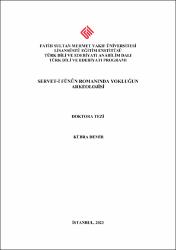| dc.contributor.advisor | Akay, Hasan | |
| dc.contributor.author | Demir, Kübra | |
| dc.date.accessioned | 2024-03-04T14:10:47Z | |
| dc.date.available | 2024-03-04T14:10:47Z | |
| dc.date.issued | 2023 | en_US |
| dc.identifier.citation | DEMİR, Kübra, Servet-i Fünûn Romanında Yokluğun Arkeolojisi, Fatih Sultan Mehmet Vakıf Üniversitesi Lisansüstü Eğitim Enstitüsü Türk Dili ve Edebiyatı Anabilim Dalı Türk Dili ve Edebiyatı Programı, Yayımlanmamış Doktora Tezi, İstanbul 2023. | en_US |
| dc.identifier.uri | https://hdl.handle.net/11352/4733 | |
| dc.description.abstract | Peyami Safa’nın mutlak olarak hiçbir şeyin var olduğuna inanmayan doktrin
olarak tanımladığı nihilizm, Nietzsche’ye göre en yüksek değerlerin kendi kendini
değersizleştirmesi, amaçların kaybolması ve niçin sorusunun cevapsız kalması,
dünyayı olduğu gibi kabullenememe, dünyanın amaçtan, birlikten ve anlamdan yoksun
olduğu gerçeğine içerleme durumudur. Dünyaya bir anlam vermeye, ona hayali bir
bütünlük atfetmeye çalışarak dünyanın anlamsızlığına, kaosuna dayanabilmek için
kaçışçı bir çözüm arayışıdır ve bu izlek Servet-i Fünûn Dönemi romanlarında kendini
göstermektedir. Tezde Halid Ziya Uşaklıgil’in Mai ve Siyah, Aşk-ı Memnu, Kırık
Hayatlar, Mehmed Rauf’un Eylül ve Ferdâ-yı Garâm ve Hüseyin Cahid’in Hayâl
İçinde adlı romanlarında bu felsefenin tezahürü ortaya koyulacaktır. | en_US |
| dc.description.abstract | Nihilism, which Peyami Safa defines as a doctrine that believes in absolutely
nothing, is characterised by Nietzsche as the self-devaluation of the highest values, the
loss of purpose, and the unanswered question of why, as well as the inability to accept
the world as it is and the bitterness towards the fact that the world is devoid of purpose,
unity, and meaning. It is a search for an escapist solution to cope with the
meaninglessness and chaos of the world by attempting to give it a fictitious coherence,
and this theme is evident in the novels of the Servet-i Fünûn period. In this thesis, the
manifestation of this philosophy will be examined in Halid Ziya Uşaklıgil's Mai ve
Siyah (The Blue and the Black), Aşk-ı Memnu (Forbidden Love), Kırık Hayatlar
(Broken Lives), Mehmed Rauf's Eylül (September) and Ferdâ-yı Garâm (The Far
Horizon), and Hüseyin Cahid's Hayâl İçinde (In a Dream). | en_US |
| dc.language.iso | tur | en_US |
| dc.publisher | Fatih Sultan Mehmet Vakıf Üniversitesi | en_US |
| dc.rights | info:eu-repo/semantics/openAccess | en_US |
| dc.subject | Servet-i Fünûn Romanı | en_US |
| dc.subject | Nihilizm | en_US |
| dc.subject | Decadence | en_US |
| dc.subject | Bengi Dönüş | en_US |
| dc.subject | Amor Fati | en_US |
| dc.subject | Güç İstenci | en_US |
| dc.subject | Bedbinlik | en_US |
| dc.subject | Servet-i Fünûn Novel | en_US |
| dc.subject | Nihilism | en_US |
| dc.subject | Will to Power | en_US |
| dc.subject | Pessimism | en_US |
| dc.title | Servet-i Fünûn Romanında Yokluğun Arkeolojisi | en_US |
| dc.title.alternative | Archaeology of Absence in The Servet-i Funun Novels | en_US |
| dc.type | doctoralThesis | en_US |
| dc.contributor.department | FSM Vakıf Üniversitesi, Lisansüstü Eğitim Enstitüsü, Türk Dili Ve Edebiyatı Ana Bilim Dalı | en_US |
| dc.relation.publicationcategory | Tez | en_US |
| dc.contributor.institutionauthor | Demir, Kübra | |



















